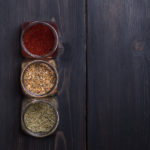By Bonnie Jenkins, Advanced Natural Wellness
Cancer. It’s no longer an automatic death sentence. But, even if it’s caught early, it can unhinge your life. Fortunately, what you put in your mouth can greatly influence whether or not you develop this life-altering illness. There is such a wealth of scientific evidence behind the diet-cancer link, that even the ultra-conservative American Cancer Society (ACS) is on board, noting that good nutrition could prevent more than one-third of all cancers.
And, according to research presented at a recent Cancer and Nutrition Symposium, adding lifestyle changes, like physical activity and stress management to a cancer-cutting diet can double that number. Diet and other lifestyle changes can also help the 15 million Americans already living with cancer, first by slowing its progression and second, by reducing the risk of recurrence.
Cancer is such a complex disease that it’s nearly impossible to pinpoint the effects of specific nutrients like vitamin A or vitamin C. For this reason, more and more researchers are looking to overall dietary intake to provide clues. Some have gone a step further by also incorporating activity or stress-management components into their research. This holistic approach promises to bring answers that are based on how we actually live our lives.
The Key Combo
You’ve heard it for most of your life – diet and exercise are the best way to ensure good health. But now, cancer researchers at Stanford University offer proof that this old axiom is true.
During the first major nutrition study aimed at breast cancer survivors, the Stanford team recently assessed the diet and activity levels of nearly 1,500 women who had survived breast cancer. Over the course of nine years, they found that women with high fruit and vegetable intakes (at least five servings a day) plus high levels of physical activity (at least 30 minutes of walking a day) were 50 percent less likely to die of recurrent breast cancer than women with who didn’t exercise and ate a diet low in either fruits or vegetables.
In fact, it surprised the researchers that sedentary women who ate lots of fruits and vegetables or women with poor diets who got a lot of exercise didn’t experience the same level of cancer protection seen by women who combined good diets and a regular exercise program. And it didn’t matter whether the women were thin or fat. All of the women eating fruits and veggies combined with exercise saw the same benefit.
MD Exposes the Hidden Danger to Your Eyes

When your eyesight starts to fail, it's a real problem. Suddenly you can't go to the grocery store... you can't get to the doctor if you have an emergency... you can't meet your friends for dinner…
Your "regular" doctor doesn't have time to keep up with the latest research. And the same goes for eye doctors. They go to school to learn how to fit you for glasses and contacts, but have no way of preventing the damage and loss of eyesight that threatens your freedom and independence.
Let me show you something that explains a LOT about how your eyes work.
In my FREE Special Report, I'll show you a HUGE, untapped resource for your eyes that safely and naturally restores clear, effortless eyesight.
Click here to get started...
Fat Matters
While body fat may not make as much difference, the amount – and type – of dietary fat you consume does.
In a large clinical trial of more than 2,400 breast cancer survivors conducted at the University of Arizona, women were taught to reduce their fat intakes by making simple changes like choosing baked skinless chicken breast over fried chicken and baked potato over French fries. For five years, the researchers monitored the women for relapse of their disease. Those in the low-fat group were nearly 25 percent less likely than the control group to have a recurrence of the disease. That number more than doubled for hormonal types of breast cancer.
But breast cancer isn’t the only type of cancer that benefits from an oil change. Other studies show that saturated fat and an overindulgence of omega-6 fatty acids (like vegetable oils) increase the risk of both colon and prostate cancer. There is also a strong correlation between fat consumption and cancer of the rectum and uterus. But, not all fats are bad. Some fats are necessary for bodily functions – and certain fats may even protect against cancer.
So here’s the skinny on fat. Replace the bad fats in your diet – saturated, hydrogenated and partially hydrogenated fats – with good fats, especially the omega-3 fatty acids found in cold-water fish and omega-9s found in canola and olive oils.
Go Vegan
Prostate cancer is on the rise – and it’s the second leading cause of cancer deaths in men. Fortunately, it’s also highly curable. The problem is traditional treatment often involves surgery or radiation. Far better to nip prostate cancer in the bud – and, thanks to a small clinical study conducted by Dean Ornish, M.D., at the University of California at San Francisco, it’s possible.
Dr. Ornish was the first researcher to show that intensive dietary changes can not only stop heart disease, but actually reverse it. This time, he put 44 men with prostate cancer on a year-long lifestyle program that included eating a very low-fat vegan diet bereft of meat and dairy. The participants also exercised almost daily, practiced yoga to control stress and attended group support classes. He then measured blood levels of PSA (prostate specific antigen) and LNCaP (a prostate cancer cell) growth.
The results? In the vegan group, PSA levels decreased about 4 percent. But LNCaP growth fell by a whopping 70 percent, a huge improvement over the control group who only experienced a 6 percent rise in PSA and a 9 percent drop in LNCaP.
Are You Suffering From...
- Love handles and a pot belly
- Romance that isn't what it used to
- Forgetfulness and inattention
- Low (or no) strength and endurance
- A sex drive that's shifted into neutral...or worse
If so...you may have Mature Male Burnout. Click here to discover more about this unique condition and what you can do about it.
So what replaces meat and dairy? How about some soy? Soy foods are rich in isoflavones. These compounds can block estrogen receptors, which stimulate certain cancers. There are numerous soy products to choose from, including fresh soy beans, tofu, soy milk and tempeh.
Beans are another good meat replacement. Not only are they high in protein, beans are an excellent source of vitamins and minerals. Beans are also high in fiber, which plays an important role in cancer prevention. Fiber helps move food through the system efficiently, thereby reducing the gastrointestinal tract’s exposure to potential carcinogens. No wonder high-fiber diets (25 grams or more each day) are linked to lower risks of breast, colon and rectum cancers.
One Last Thing …
I know a few folks who visibly recoil whenever I mention the virtues of soy – especially when it comes to cancer. The controversy surrounding whether too much soy could actually be harmful started about 10 years ago when a scientist from the University of Illinois found that a major component of soy isoflavones called genistein actually promoted tumor growth in immune-deficient rats with estrogen-dependent breast cancer. Despite the fact that there isn’t any evidence from human clinical research or even population studies to support this conclusion, the debate over soy safety rages on. But lately, data refuting the decade-old findings have mounted.
Studies of breast biopsies taken before and after exposure to isoflavones show no effects on breast cell proliferation – an important marker of breast tumor growth. But some of the strongest evidence in support of soy comes from data suggesting that soy exposure during childhood and adolescence markedly reduces breast cancer risk later in life. In fact, eating as little as one daily serving of soy food early in life slashes breast cancer risk by as much as 50 percent.
A new population study simply adds to the evidence that soy is a potent anti-cancer food. Researchers report that among the Chinese study participants, those with the highest intake of soy foods were the least likely to die of breast cancer or have a recurrence of the disease. The benefit of soy food intake on survival was most pronounced among those women with hormone-sensitive breast cancers.
Research Brief …
Last month, I talked about the silent risk of high blood pressure – along with ways you can bring the pressure down. Well, thanks to a new study presented at the American Heart Association’s annual conference, you can add one more.
It turns out that simply drinking three cups of hibiscus tea daily lowered blood pressure in a group of 65 pre-hypertensive and mildly hypertensive adults. How much? How about a 7.2 point drop in their systolic blood pressure, compared to a 1.3 point drop in the volunteers who drank a placebo beverage.
Those with the highest blood pressure levels at the start of the study experienced even better results. Their systolic blood pressure went down by an impressive 13.2 points, diastolic blood pressure went down by 6.4 points, and mean arterial pressure went down by 8.7 points.
If you’ve never tried hibiscus tea, it’s delicious. Plus, setting aside some time each day for a cup or two of this caffeine-free tea can soothe away stress and help you re-focus on the important things in life.
References:
2008 Cancer and Nutrition Symposium. The Cancer Project. More information available at www.cancerproject.org/Symposium/
Kim MK, Kim JH, Nam SJ, et al. “Dietary intake of soy protein and tofu in association with breast cancer risk based on a case-control study.” Nutrition and Cancer. 2008;60:568-576.
Kushi L, Giovannucci E. “Dietary fat and cancer.” American Journal of Medicine. 2002;113 Suppl 9B:63S-70S.
McKay DL, et al “Hibiscus sabdariffa L. Tea (Tisane) Lowers Blood Pressure in Prehypertensive and Mildly Hypertensive Adults” AHA Meeting 2008; Abstract 3278.
Pierce JP, Stefanick ML, Flatt SW, et al. “Greater Survival After Breast Cancer in Physically Active Women With High Vegetable-Fruit Intake Regardless of Obesity.” Journal of Clinical Oncology. 2007; 25: 2345-2351.
Thomson CA, Rock CL, Giuliano AR, et al. “Longitudinal changes in body weight and body composition among women previously treated for breast cancer consuming a high-vegetable, fruit and fiber, low-fat diet.” European Journal of Nutrition. 2005;44:18-25.





